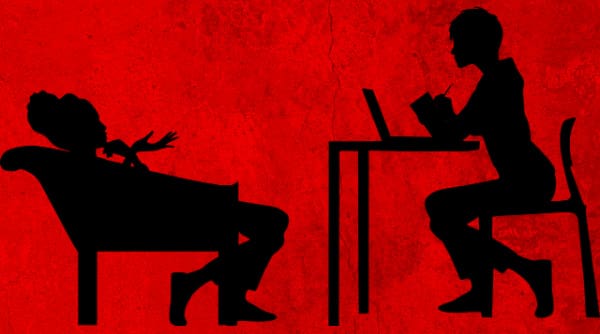What happens if I’m Catholic and my therapist suggests I try a medically approved form of Buddhist meditation?
Buddhist mindfulness meditation can actually be very bad for me as a Catholic. We hope that our doctors have our best interests at heart; however, Catholic discernment might not be in their skillset. Jeff Thompson, a licensed psychotherapist with a background in spiritual theology, a Benedictine Oblate, Ignatian Director, and Carmelite therapeutic theorist, explained it to me during a recent Avila Institute class: “Sadly, rejection of Christianity has also opened the field, ironically, to Buddhist and “New Age” influences. “Mindfulness” has been applied to nearly every aspect of psychotherapy.”
Author and teacher and frequent contributor on Spiritualdirection.com, Connie Rossini, recently took the time to answer some of my questions about the difference between Buddhist meditation versus a more Catholic approach.
“The first thing to note is (about Buddhists),” she begins, “when they are meditating they are not addressing a god usually…So it’s meditation but when it’s Buddhist it’s not generally prayer.”
She explains it further in three main points:
- “These meditation practices were designed to facilitate a Buddhist way of life and a Buddhist way of thought…Similarly what a lot of people miss is that the very act of eastern meditation is oriented in a direction that is different and in conflict with Catholic spirituality.”
- “Buddhist meditation requires you to form a kind of Buddhist detachment from all your thoughts, from your emotions, your desires, your imagination…And this is the exact opposite of what the Catechism tells us we are to do in Christian meditation.”
- (When speaking of Buddhist practices) ”…they tend to create a euphoria, a sense of peace, a sense of wellbeing, and people very easily mistake that sense of euphoria for consolations from God.… of course, that can then lead people not to seek conversion….I think it can be directly destructive for your prayer life.”
While Buddhist meditation or mindfulness is often prescribed for those just complaining of basic stress, even science is now confirming that it could be harmful for some people. Recent scientific studies have found that Buddhist meditation might even lead to an exacerbation of mental health issues.
Jeff Thompson indicates that more needs to be done on the flip side. “There is good science being generated about its positive psychological benefits for everything from anxiety reduction to pain management to smoking cessation, but there is, of course, little research being done either on similar benefits of classical Christian practices, and even less research on possible spiritual difficulties that can arise from the practice (e.g., some evidence of strong traumatic reactions and even psychosis in a few cases).”
Connie Rossini adds that “they have seen people who have become obsessed or even possessed through eastern meditation practices. Does that mean it happens to most people who do them? I doubt that it does. It’s probably a small percentage. But you have to recognize that this is a possibility.”
Unfortunately, few people will be scared away unless they have had their own negative experiences with treating themselves with New Age practices. I know because I have learned that mistake myself. I don’t fault anything specific except that by not practicing my Catholic faith I left myself spiritually vulnerable and without the discernment to know what to avoid.
While I was raised loosely Catholic and received my First Holy Communion, my family drifted away from the faith, and I didn’t attend Mass regularly over the years. I maintained some semblance of faith through Christian TV and I had enough of God’s hand on my life so that when I was in trouble and called upon Him, He was there—but I realize now how risky it was to be so far from the Church. Struggling emotionally, I had tried New Age treatments, including hypnosis, and medication—but eventually had a mental health episode that led to a deep spiritual encounter with Jesus Christ and a return to the practice of the Faith.
I was just recently confirmed in the Catholic Church. I still wonder had I been confirmed way back in my youth if my life would have worked out differently and better. Regardless, I now see that that traumatic experience as actually a gift, in that it alerted me to possible dangerous influences and made me more disciplined in my Catholic faith.
Father Joseph Illo, the pastor at Star of the Sea Parish in San Francisco, the Church where I will be confirmed, suggests that rather than mindfulness meditation or any other “New Age” treatments which may be—and often are—recommended by therapists or doctors, Catholics should start with some holy reading.
“So regaining our peace is task #1 for the Christian life. I recommend a little book, ‘Searching for and Maintaining Peace’ by Jacques Philippe. It’s a good starting point. He’s a French priest. And the point is if we don’t have peace then we can’t even think straight. This is how to regain our orientation.”
He goes on to recommend three things in Christian practice that bring peace of soul.
- Prayer. “That means not just meditating on nothingness, which is Buddhism but meditating on the word of God. The Bible is the only writing that’s inspired 100% and inherent with no errors of faith.”
He lists other possible materials as biographies of saints, the writings of saints, church documents, encyclicals of popes, and the Catechism of the Catholic Church.
“There’s plenty to meditate on, but most of all the Bible. So what does that look like? One hour a week of silent meditation with the word of God. Then you have some silence where you let it sink in. Maybe read it again with more silence…but it’s not stillness around nothing. It’s stillness so you can hear the word of God. It’s called meditation.”
- Community. “Practicing friendship, so cultivating like you would cultivate a garden. Friendships have to be nourished and tended. They don’t just pop up out of nowhere. The Mass is communal and community building. It’s built around the Eucharist, the person of Christ, but friendships come out of that. The relationships are strong enough to sustain a lifelong commitment to a way of life. What does that look like? It means talking to people after Mass, inviting others over to your home, accepting invitations, or planning events.”
- Serving the poor. “There’s nothing that builds a friendship more than a sense of common purpose in serving the poor, the poorest of the poor. I don’t mean just writing a check to some overseas aid agency but touching the people and touching them maybe not physically but being there with them. It’s hard at first, especially to go down in the street and start talking to people, but they are so grateful and so human. They want to talk with you.”
- He adds that “self-absorption is the great enemy.” And the above steps are the way to take the focus off your problems. He ends, “It’s a way of healing yourself without chemicals and psychotherapy.”
And while I benefitted from therapy and from my non-Catholic doctors and therapists, (and don’t know that I could have recovered without them), it is always necessary to seek first a relationship with the Divine Physician and turn away from counterfeit methods of healing. If necessary, seek out care from a Catholic therapist or Catholic doctor with an understanding of the Faith—although as Jeff Thompson indicates they are not in the majority. He states, “There are a few of us out there, but not many. We work in a field that is rooted in materialist science, i.e., that only the measurable and observable exist.”
For guidance, I also recommend meeting with a solid spiritual director. Mine has been most helpful for me to process the spiritual experience/episode that I had.
Image courtesy of Pixabay.
For tips on finding a Spiritual Director, get a free download here.




